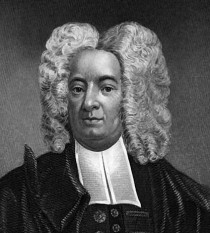
Cotton Mather (1663-1729), son of Increase Mather and grandson of John Cotton, was a third generation American Puritan who did more than any of his contemporaries to perpetuate the vision of the founding fathers.
Entering Harvard at 12, his youth was remarkable for its precocity. At 19 he became assistant to his father in the 1,500 strong Second Church of Boston (the then chief city in America) and when he was 25 no-one questioned his ability to lead the church during his father’s 4-years’ absence in England.
During his 47 years of ministry the pattern of his life was unchanged. To a remarkable extent he combined public activity (especially in preaching and philanthropic work) with a life of prayer and study. His role as ‘a vigorous defender of the Reformed doctrines of grace’ (which contributed to a family breach with Harvard) and his personal idiosyncracies (usually magnified by critics) brought him into trouble with some of his contemporaries, but the full exposure of his life to the world in his Diaries (published 1911) undeniably confirms his eminence as a Christian. Naturally conservative, he was not uncritical of aspects of the New England theocracy, and his thinking prepared the way for a broader vision of evangelical unity. His readiness to introduce changes for the better was also demonstrated by his advocacy of inoculation against smallpox.
Twice bereaved in marriage, and with a third wife who became mentally unstable, Mather ‘had great domestic afflictions’. He was familiar with death long before he declared at the age of 65, ‘My Last Enemy is come, I would say my Last Friend’.
Of his 382 books (mostly sermons) his best known were Essays to Do Good – a work which influenced the young Benjamin Franklin – and his Student and Preacher (Manuductio ad Ministerium), regarded by John Ryland, who reprinted it in 1781, as without equal. But unquestionably, as his biographer Barrett Wendell (1891) writes, his Magnalia Christi Americana (The Great Works of Christ in America, reprinted by the Trust in two volumes in 1979) ‘remains by far the most notable of his publications’.
[ Volume 1 of Great Works contains a Memoir of Cotton Mather by Samuel Drake.]